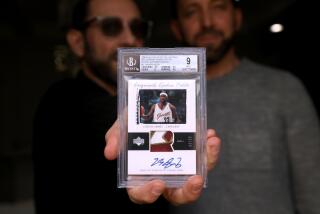Pair Post Big Profits in World of Stamps
- Share via
OWINGS MILLS, Md. — Scott Tilson and Jeffrey Franz knew nothing about selling postage stamps when they took a chance on Elvis.
Five years later, they are inspiring disgust and respect with their innovative marketing of a hidebound hobby. They’ve even been sued by the Beatles.
The two men already had decent businesses when they met in 1992 at a printer they were both using. Tilson, 33, sells rare coins and Franz, who gave his age only as late 40s, produces poetry anthologies. After whirlwind conversations about direct marketing, they decided to try something together.
“We looked at pet products, collectibles, entertainment,” Franz said. “We looked at the idea of Elvis.”
At the time the U.S. Postal Service was hyping its upcoming Elvis stamp. Franz and Tilson discovered that the Caribbean island of St. Vincent had already issued a set honoring the King. With the help of a consultant, they bought all they could: 167,000 sheets.
“Elvis sighted . . . “ they wrote in a cheeky news release of puns on Elvis songs. Media around the world publicized the stamps and the toll-free number to Franz’s book company.
Six giddy weeks of taking orders later, Franz and Tilson had a profit of $1.5 million and a mailing list of 80,000 buyers.
“It catapulted us into a major new organization,” Franz said.
The pair formed the International Collectors Society and tried to follow up by selling Elvis memorabilia. Boxes of unsold Elvis pens and watches now collect dust somewhere in their 6-month-old building.
“We found out [people on the mailing list] had already bought all these products,” Franz said.
So ICS tried to sell another stamp. This time the U.S. Postal Service was promoting an upcoming Marilyn Monroe stamp. Franz and Tilson found stamps from Montserrat featuring the blond icon and sold out again.
That set the course of their company. Since then, ICS has sold stamps depicting Jackie O, Socks the presidential cat and the Beatles, among others, many of them outselling those first Elvis stamps, they said.
The countries issuing the stamps--such as Chad, Central African Republic and Grenada--make arrangements with a U.S. agent to sell most of the stamps to collectors as a type of export. The subject matter is heavily controlled by the agent and the stamps are usually printed in England.
The Inter-Government Philatelic Corp. in New York had put together the Elvis and Monroe stamps that ICS sold, but Franz and Tilson wanted to make some of their own deals.
They hired John Van Emden, a former U.S. Postal Service executive who also had experience with mass market collectibles and, most important, was a foreign stamp agent.
With Van Emden, ICS has become a juggernaut.
“By this time we had become almost celebrities to these small countries,” Tilson said. “They were eager to work with us.”
That relationship caught the attention of a certain former rock ‘n’ roll group that wanted a piece of the action.
“Getting sued by the Beatles was the most fun we’ve had,” Franz said.
The Beatles and Yoko Ono claim ICS, as an agent, has infringed on their copyright. ICS claims the sovereign nations they contract with may put whatever they want on their stamps.
Nonetheless, all the parties are trying to work out a licensing deal, Franz said.
Although Franz and Tilson sell stamps, they are not like any other stamp dealer, experts said.
ICS blitzes the mass market in supermarket tabloids, newspapers and magazines with ads that cost as much as $150,000 each, Franz and Tilson said. Their stamps are also being sold on home shopping cable TV channels.
Traditional dealers advertise in hobby and trade publications.
“These fellows are out there advertising to non-collectors,” said Joseph Savarese, executive vice president of the American Stamp Dealers Assn. “It’s the only way the hobby’s going to grow.”
But that kind of sales power, with markups twice that of traditional stamp dealers, has upset some in the genteel hobby.
“They are strictly promotional things that have no intrinsic value as stamps,” said Herman Most, owner of Maryland Stamps & Coins in Bethesda. “They are manufactured to appeal to people who buy whimsical items. They’re equivalent to souvenirs.”
Most, who has been in the business for 30 years, has seen the hobby decline. His mailing list dropped from a high of 75,000 in the 1970s to about 45,000 now. Less than 10,000 of those are active, he said. The typical markup of a new stamp that he sells is twice face value.
By contrast, ICS has a mailing list of 600,000 and their markups are four times face value.
But after marketing blitz sellouts, ICS-sold stamps have greatly reduced value on the philatelic market, Most said.
“We see this stuff all the time,” he said. “We feel bad having to tell people we can’t buy their stamps because we don’t have people buying them from us.”
That doesn’t surprise David Maloney, vice president of the International Society of Appraisers. He said the stamps are marketed like other “collectibles” such as plates and die-cast products, with ads that imply the item will increase in value.
“They’re doing the public a disservice,” he said. “There’s very little investment potential.”
But ICS, which is a member in good standing of the stamp dealers association and the American Philatelic Society, abides by the ethics of those organizations, according to officials there.
Franz, who was once a Fuller brush man, and Tilson, who started his coin business in college, are proud of the controversy kicked up by ICS.
“Stamp collectors kind of look down on our stamps,” Franz said.
“They say we’re not real stamp dealers. But we’re selling stamps and more than anyone else,” Tilson said. “Our goal is to reach as many people as we can.”
More to Read
Inside the business of entertainment
The Wide Shot brings you news, analysis and insights on everything from streaming wars to production — and what it all means for the future.
You may occasionally receive promotional content from the Los Angeles Times.










